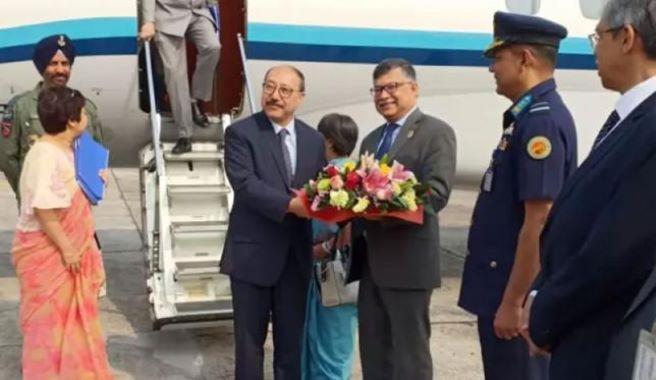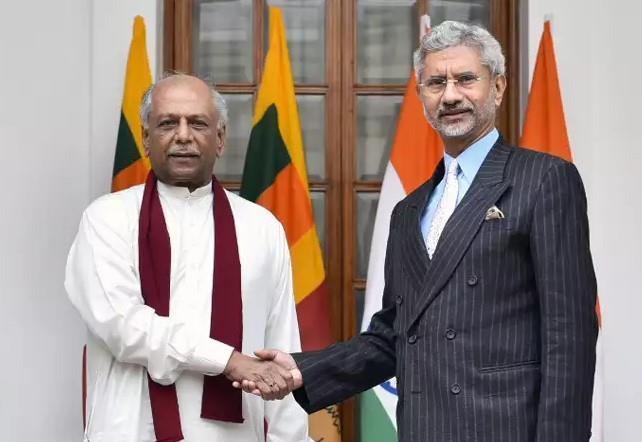
Facing challenges elsewhere, India's reinforces ties with Sri Lanka and Bangladesh
(MENAFN- NewsIn.Asia) By P.K.Balachandran/Daily Express
Colombo, August 20: Plagued by conflicts with neighboring China, Pakistan and Nepal, India is showing renewed interest in forging close ties with the still friendly Sri Lanka and Bangladesh and keep Prime Minister Narendra Modi's 'Neighborhood First' policy alive.
On August 18, the Indian External Affairs Minister, Dr. S Jaishankar, spoke to his Lankan counterpart, Dinesh Gunawardena, to congratulate him on his reappointment as Minister of Foreign Relations and say that he looked forward to working closely to take India- Sri Lanka partnership to greater heights. The Indian side said that the strong mandate received by the Sri Lankan Government in the parliamentary elections would play a key role in strengthening the commitment on the part of both the countries to take the bilateral relationship forward.
India has many economic issues pending, such as its participation in running the Colombo port's East Container Terminal (ECT), the Trincomalee oil tanks, as well as more than a dozen projects for which MOUs were inked in 2017. But of late, it has put emphasis on the Buddhist links between the two countries. The present Indian High Commissioner Gopal Baglay is leading by example in this sphere. And on his part, Prime Minister Narendra Modi has invited the Sri Lankan Airlines to operate the first international flight from the new international airport at Kushinagar, a town in Uttar Pradesh associated with the Buddha.
India's using Buddhism to firm up ties with Buddhist-majority Sri Lanka is significant because both China and Pakistan have started harking back to their Buddhist past to buttress ties which have so far been based on other considerations such as investments and aid in the case of China and military sales in the case of Pakistan. China, especially, is investing quite manifestly in soft power to give its economic clout a human and caring face. Pakistan is trying to create the impression that it is not a country of Islamic extremism but a tolerant one which cares for its Buddhist past.
However, there are bread and butter issues like the ECT, and the Tricomalee Oil tanks will have to be taken up to give the existing goodwill a firm foundation. A Memorandum of Cooperation (MOC) had been signed on the ECT according to which the Terminal Operations Company to be formed would be jointly owned by the Sri Lanka Ports Authority (51% shares); Japan (34%) and India (15%). While India has been seeking a presence saying that 70% of Colombo port's business is transshipment to and from India, a section of the Lankan government and the port workers' union do not want the operation of the port to be given to any foreign entity (overlooking the fact that a Chinese company is running a terminal in the same port).
The Rajapaksa government will have to take a call on this quickly as India could choose another hub for transhipment of Indian cargo, depriving Colombo port of 70% of its business.
The case of the Trincomalee oil tanks is also pending apart from about 15 other projects. In 2003 India was given the 99 oil tanks in Trincomalee for refurbishing and use. But only 15 tanks have been refurbished and used so far. The Sri Lankan government had wanted 16 of the remaining 84 tanks to be handed over to it. Finally it was decided that the 84 tanks will be jointly developed. But there is a standstill in this matter. On the other joint projects the Rajapaksa government said that it would go ahead with some and opt out of others. But there is a standstill here too.

Harsh Vardhan Shringla being welcomed by Masud bin Momen Bangladesh Foreign Secretary
Bangladesh
As far as Bangladesh is concerned, Indo-Bangla relations, which had been very cordial and fruitful since 2008, hit a bad patch with India declaring 1.9 million people in Assam as non-citizens and dubbed them as ill-legal migrants from Bangladesh. The Indian Home Minister, Amit Shah, described them as 'termites' to be got rid of. But Bangladesh denied that they were Bangladeshis. There was no agreement on the sharing of the waters of the river Teesta. The shooting of Bangladeshis on the border by the Indian Border Security Force went on unabated despite protests from Dhaka.
Bilateral tension led to the cancellation of some important high level visits by Bangladesh. Recently, a Bangladeshi and an Indian paper carried a story saying that Bangladesh Prime Minister Sheikh Hasina had not given an appointment to the Indian High Commission Rava Ganguly for four months. There were also reports in the Pakistani media that the Pakistani High Commissioner had met the Bangladeshi Foreign Minister and that this signaled a thawing of ties with Pakistan. This caused ripples in New Delhi.
But after a period of suspense-filled silence, Bangladesh let it be known that due to COVID-19, Prime Minister Hasina had not met any foreign envoy and not just the Indian envoy. The Bangladesh government described its relations with India as 'rock solid.'
To end speculation that Bangladesh was spinning out of India's sphere of influence into the arms of China and Pakistan, the Indian Foreign Secretary Harsh Vardhan Shringla visited Dhaka and had a one hour one to one chat with Prime Minister Hasina. A range of issues were discussed including the behavior of trigger-happy Indian border guards at a time when cattle and human smuggling has actually stopped. It is understood that the two discussed the difficulties encountered in some India-financed projects due to problems of mobilization of resources and sourcing of material for the projects. However, the sharing of the waters of the Teesta river remains an issue, with the Bangladeshis complaining that India is trying to change the agreement reached earlier.
Be that as it may, it is not easy to break India-Bangla ties. Bangladesh is India's biggest trade partner in South Asia. India's exports to Bangladesh for financial year 2018-19 (April-March) stood at US$ 9.21 billion and imports from Bangladesh for the same period stood at US$ 1.22 billion. India has ensured duty-free access of Bangladeshi goods to the Indian market, especially ready-made garments.
Energy cooperation between the two sides has also shown a lot of positivity with the Indian state of Tripura supplying 160 MW of power to Bangladesh in addition to the 500 MW the country is receiving from West Bengal since 2013. India has a transit agreement with Bangladesh which allows its goods to travel across Bangladesh from West Bengal to Tripura cutting the travel time significantly.
(The featured image at the top shows the Indian Foreign Minister Dr.S.Jaishankar with his Lankan counterpart Dinesh Gunawardena)

Legal Disclaimer:
MENAFN provides the
information “as is” without warranty of any kind. We do not accept
any responsibility or liability for the accuracy, content, images,
videos, licenses, completeness, legality, or reliability of the information
contained in this article. If you have any complaints or copyright
issues related to this article, kindly contact the provider above.


















Comments
No comment